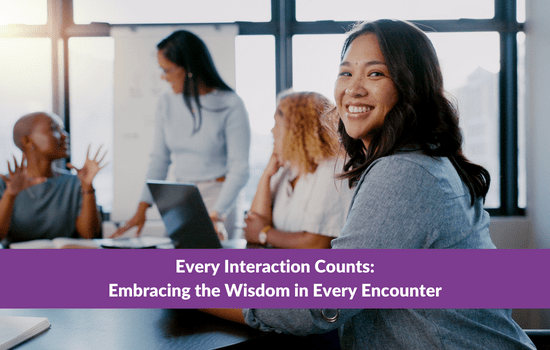What did you learn from your last interaction? We can learn a lesson from everyone we encounter, which enhances our personal growth and increases our emotional intelligence.
 Wisdom in Unexpected Places: Lessons from Everyone You Encounter
Wisdom in Unexpected Places: Lessons from Everyone You Encounter
Every interaction we have counts. Embracing the wisdom embedded in each encounter is a journey that uncovers the richness within seemingly ordinary moments. Whether big or small, these interactions shape our lives and strengthen our emotional intelligence. All connections are significant as they provide valuable insights.
How Does Emotional Intelligence Enhance Our Interactions?
Emotional intelligence increases our ability to learn from interactions by providing a deeper understanding of our emotions and those of others. It allows us to navigate social situations with empathy and self-awareness, fostering effective communication and relationship-building. Through recognizing and managing emotions, we gain insights into different perspectives, learn from diverse experiences, and adapt our behaviour accordingly. Emotional intelligence promotes continuous learning and personal growth in our interactions with others.
How Do Children Learn?
Have you ever considered the fascinating way a toddler learns to talk by being around conversations they don't even participate in?
Toddlers learn to talk by being immersed in a language-rich environment. They observe and imitate others, gradually developing their vocabulary and language skills through interactions with caregivers, family, and peers. Social interactions play a crucial role in language acquisition during this developmental stage.
We teach our children so much more than language. Their minds are like sponges, soaking up mannerisms, conversation styles, and temperament. We're primarily teaching them how to communicate, and these interactions unquestionably enhance their emotional intelligence.
On that note, here's some information about raising emotionally intelligent children that you won't want to miss. This form of learning continues throughout our life cycle.
Are You A Lifelong Learner?
A lifelong learner is committed to continuous learning and personal development throughout life. This mindset involves actively seeking knowledge, skills, and experiences, often beyond formal education, to adapt to new challenges, stay informed, and foster personal growth. Lifelong learning advances emotional intelligence, which supports our interactions with others.
Did you know that Individuals with high emotional intelligence like to spend time with those who are more intelligent than they are?
Individuals with high emotional intelligence often value learning and personal growth. Spending time with more intelligent people allows them to engage in intellectually stimulating conversations, gain new insights, and expand their knowledge. Additionally, they may appreciate learning from others' perspectives and experiences, fostering a more enriching and diverse social environment.
We learn constantly from our most valuable resources—the people we spend the most time with. That's just one reason it's essential to surround yourself with your people. Similarly, as we get older, we can learn consciously, whether it be through formal or informal learning and education.
The Benefits Of Formal and Informal Learning
There are numerous benefits to formal and informal learning, and extensive research reinforces the importance of both. Formal learning is paramount to individual growth and development, but informal learning is equally important.
What exactly do I mean by that?
Informal learning is unofficial, unscheduled, or impromptu knowledge we gain from others. It can be uniquely enriching when we take time to be mindful and notice our surroundings.
How Important is Informal Learning?
Informal learning occurs constantly and usually when you least expect it to. There are numerous advantages, such as:
- Flexibility - Informal learning is adaptable to personal preferences and schedules, allowing individuals to learn at their own pace and convenience.
- Cost-Effective - Informal learning methods, such as self-directed study or online resources, can be more cost-effective than formal education.
- Real-world Application - Informal learning often emphasizes practical, real-world application of knowledge, promoting skills that can be directly applied in various contexts.
- Continuous Adaptation - Informal learning encourages a constant learning mindset, enabling individuals to adapt to changing environments and stay current in rapidly evolving fields.
Combining formal and informal learning can create a well-rounded and versatile approach to lifelong learning, leveraging the strengths of each method.
Learn a valuable lesson from everyone you encounter–this is the best way to stay flexible, open-minded and less stressed. Embrace opportunities where you are caught off guard and learn something. - Dr. Travis Bradberry
Remember, you can learn a lesson from everyone you encounter. Do you want to enhance your personal growth and interactions with one-on-one guidance, self-development, team building, employee relationships, and more? Click here. Build your emotional intelligence through these books: The Power of Emotion and The Mindful Journal: Cultivating Emotional Intelligence through Reflective Writing.
Did you like this post? If you'd like to see more like this, have a look at these articles:Regulating Your Emotions Will Make You More Successful
Embracing Emotional Intelligence: Emotions as Catalysts for Rational Choices
6 Easy Ways to Eliminate Obstacles & Change Your Life
This article was originally published on January 8, 2017, and has been updated (January 2024).
More Motivational Reads Here »
How Emotionally Intelligent Are You?
Sign up for monthly tips to build your Emotional Intelligence and reduce Emotional Hijacking!

















